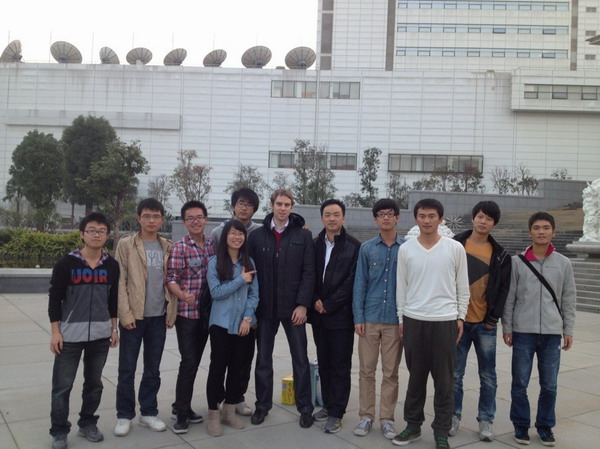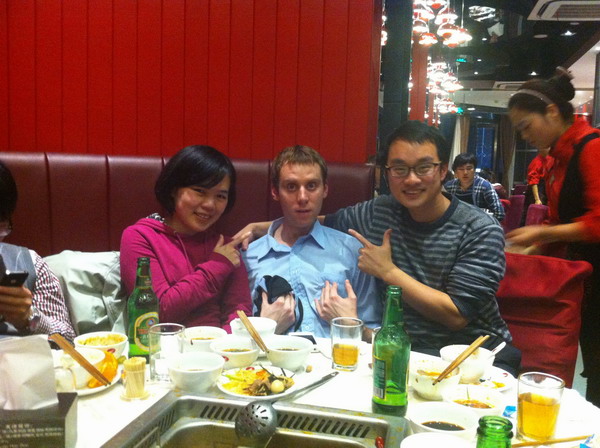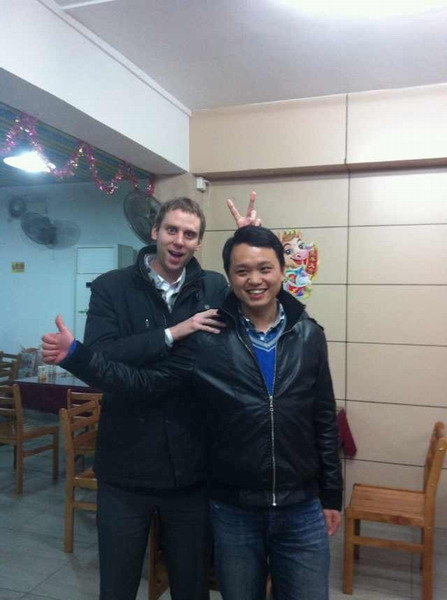

European workers spend more than 20 minutes of their work day having coffee breaks. Those who decide to move to China - I am one of them - often take this habit with them. At my Fuzhou company, all the foreigners will meet up for the coffee break in a relaxed and informal atmosphere. In the country of relationships, I am still to understand why the Chinese haven't picked up this habit yet.
 |
| Being the only foreigner in the group. |
One may actually wonder why the importance of relationships seems overrated in China. Don’t we hear that “it is all about who you know” and that networking is crucial for anyone’s career even outside of China? Still, China has its very own way of doing things. Here are a few thoughts about my relationships with locals in Fuzhou, for better or for worse.
Is this my business?
 |
| Cross-generational socializing |
Once I had learnt the basics of communication, such as the avoidance of physical contacts during greetings, I noticed that something in relationships was different from what I knew. In China, a set of more or less explicit rules define how people should handle their relations with others. My ignorance has probably unsettled some people I met during my first months, but they never told me. Understanding the unspoken was something I had to learn.
I also noticed that professional relationships and friendship were based on the same principles; something we can’t really say in the West. For example, when my teammates left the company to continue their career elsewhere, our group spirit did not fade away. Likewise, when I meet my customers, we seldom talk about business and discuss the same topics as those I would address with friends.
How many beers can you drink?
 |
| Great meal, great friendship |
In a contradictory manner, those rules of relationship do not mean that getting to know someone equates to following a formal process. In fact, my Fuzhou acquaintances are expert in connecting informally with all kinds of people, most notably during a dinner. As a foreigner, it seems that most of what I learnt about the local culture was at one of those round tables.
When I am the only foreigner at the table, I do not ‘weigh’ enough to internationalize the gathering, so it remains very Chinese… And Interesting.
People often drink during the dinner, but unlike Westerners who do so to lower their inhibition, the Chinese drink to make a connection. When they ask you “How many beers can you drink?” they may actually be asking you “How friendly are you?”
What do my friends think?
 |
| Me and my amazing Fuzhou friend |
One thing you do not learn when you start living in China as a foreigner is humility. Friends and colleagues keep complimenting you on your looks, brains or your hesitant language skills being “excellent”. One quickly realizes that those praises do not carry their apparent meaning but are rather the result of unwritten rules of communications. It is always hard to know what my acquaintances really have in mind.
Actually, the highest compliment I got during my life in Fuzhou is “you are a Chinese expert”. This common expression means that you genuinely understand the way the Chinese think. Once again, when someone qualifies you as such, it doesn’t mean that it is true. Fujianese are proud of their Chinese identity. Although you may learn the language, study the history and live in the country for many years, you will always be a foreigner. It is some kind of exclusive club.
When you inquire people in an attempt to understand how they reason, you often get this type of reply: “Oh you know, this is something only the Chinese people can understand”. Frustrating from time to time.
Random friends
When I make new acquaintances in Fuzhou, they often suggest that we keep in touch or even invite me to visit their hometown in the future. Although those invitations are usually just words, they make me feel welcome. Foreigners find it easy to come into contact with people in Fuzhou especially as the Chinese have a long-term vision when it comes to relationships.
When I walk in the street near my Taijiang apartment, random people enjoying street-side snacks often ask me to join their table. The Chinese like to know why foreigners come to Fujian, and they particularly enjoy when I tell them how much I like the country. They tell me that they wish they could travel more but that that they need to work very hard for their family. I believe that.
All in all, dealing with people in Fuzhou is both easy and tricky. Easy because people will treat strangers well and respect the one who came from a distant location to meet them. It is also tricky because many rules - such as reciprocity - need to be followed in order to leave a good impression; and those rules are often unspoken.